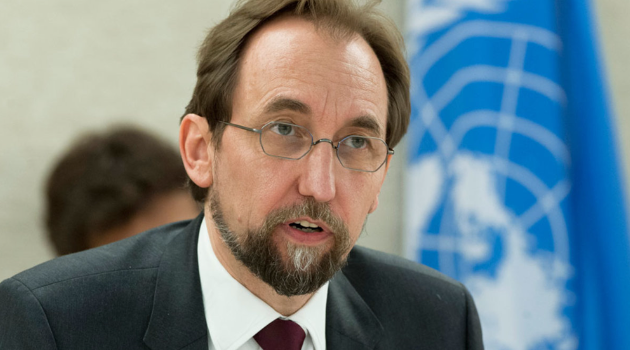Statement by UN High Commissioner for Human Rights Zeid Ra’ad Al Hussein at the end of visit to Libya
No UN High Commissioner for Human Rights ever managed to make an official visit to discuss the human rights situation in Libya during the time of Muammar Gaddafi or in the years following the end of his dictatorial regime.
So even though the security situation meant I could not announce in advance my brief official mission to Libya on Tuesday, I was at least able to make the visit and hold a round of useful discussions with Prime Minister Fayez Serraj, the Ministers of Justice and Interior, and the Head of the Department responsible for managing migration detention centres. I was also able to pay brief visits to one of the country’s main prisons and a camp for displaced people.
My trip was further informed by a very useful meeting with Libyan civil society and women human rights defenders.
I wish to thank the Prime Minister for inviting me to Libya, and for the hospitality I received while I was in Tripoli. I also appreciate the assistance provided by the Special Representative of the Secretary-General Ghassan Salamé, and the United Nations Support Mission in Libya (UNSMIL).
The visit was very short but potentially important. It was intended to stimulate, and hopefully sustain, not just a productive dialogue but also concrete actions which could ultimately lead to significant improvements in the lives of the people of Libya.
Clearly, in a single day, we could not begin to cover all the human rights issues affecting the country, so I chose to focus on arbitrary detention, torture and other grave violations which are particularly urgent.
During the meetings, officials repeatedly highlighted Libya’s commitment towards ensuring the protection of human rights. I welcome these commitments, and note with appreciation that efforts are being made to facilitate the visits of Special Procedures mandate holders.
Officials also highlighted the significant challenges in Libya due to years of violence and instability, a near-breakdown in the rule of law, the proliferation of armed groups, a deteriorating humanitarian situation, the internal displacement of hundreds of thousands of people, and severe disruption to the provision of basic services to the population.
I appreciate the magnitude of these challenges, and have heard how they affect the Government’s ability to undertake and fulfil its duties. At the same time, I have put forward suggestions in areas where progress can be progressively made if appropriate action is taken.





